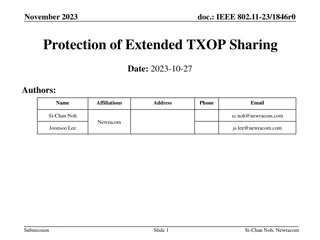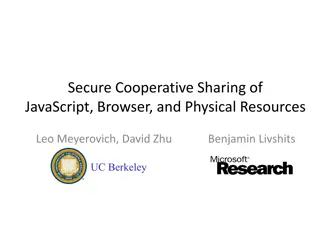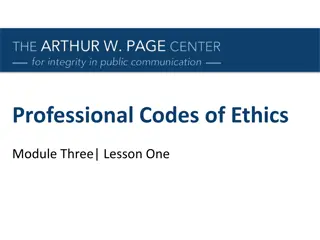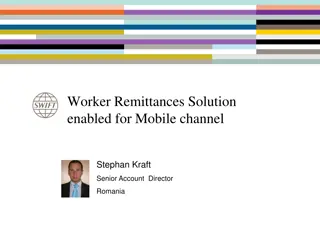The Ethics of Sharing: Health Social Worker Concerns
Health social workers face challenges when recording sensitive information in shared records. This study explores their concerns and strategies for protecting client privacy while ensuring relevant information is shared appropriately through qualitative interviews with eleven practitioners. Strategies such as leaving out details and having multiple sets of notes are discussed as ways to navigate ethical dilemmas in recording practices.
Download Presentation

Please find below an Image/Link to download the presentation.
The content on the website is provided AS IS for your information and personal use only. It may not be sold, licensed, or shared on other websites without obtaining consent from the author.If you encounter any issues during the download, it is possible that the publisher has removed the file from their server.
You are allowed to download the files provided on this website for personal or commercial use, subject to the condition that they are used lawfully. All files are the property of their respective owners.
The content on the website is provided AS IS for your information and personal use only. It may not be sold, licensed, or shared on other websites without obtaining consent from the author.
E N D
Presentation Transcript
The Privacy Good Research Fund THE ETHICS OF SHARING: HEALTH SOCIAL WORKER CONCERNS ABOUT RECORDING IN SHARED RECORDS Isobel Cairns The University of Auckland School of Population Health
INITIAL QUESTIONS Health practitioners are required to make judgments when they record, including about information which is particularly sensitive or stigmatising. Health social workers frequently come across such sensitive details in the course of their work, which they are required to record in notes that are accessible to other practitioners. What concerns do they have about recording in shared records, and how should they be resolved?
METHODOLOGY I pursued an empirical ethics study based on pragmatism. This included background theory and qualitative interviews. Eleven health social workers talked to me for an hour about their recording practices, their ethical concerns and judgements.
THE INTERVIEWS Three different regions across the North Island. Four had roles associated with mental health care, two worked with older persons, two in oncology, two had general hospital-based roles, and one worked in primary care. A range of ages from roughly late twenties to early sixties; one male, ten female.
THE DETAILS OF NOTE TAKING PRACTICE Participants reported that they kept a number of sets of notes, which could be accessed by a variety of people. Some of these records were hard copy and some were electronic. One participant worked in an organisation where she deliberately kept two records, but this wasn t the experience of most. Caring for the client includes sharing information participants were happy to share notes with colleagues.
1 Like I say, that is why I separate out the notes that I put in [system name] and the additional information, is that sometimes I do think information should be held back, or not. But generally that's because I don't think it's relevant, rather than because of an ethical concern. [ ] That is the primary purpose of that record, is it's a health record. So if someone's health is being impacted by something, then that is relevant information.
LEAVING OUT DETAILS Leaving out the details was a common strategy for ensuring that what was recorded was useful to others and that the client s privacy was protected. Participants were wary about what might happen to the record in the future. They were concerned about how other health professionals might treat certain pieces of information, and also felt a need to be respectful, avoiding exposing clients in the record unnecessarily. Yet, recording of sensitive information would need to take place if it was deemed to have an impact on the client's health or healthcare.
7 But you can put things about people that information the situation without being too detailed. Like I will say, where there's a conflictual family, 'There appears to be pre- existing conflicts in the family.' Full stop, leave it there. So the next person will go, 'Oh, OK, the family don't get on.' But you haven't said what's gone on, unless it's actually relevant to what you need to be doing.
RECORDING OPINIONS All participants stated they would record their impressions, but they would be careful to distinguish them as such. It was important because social workers would be legally accountable for their notes. Being clear about what was fact and what was opinion was important for ensuring the record didn t send a team off on a totally wrong direction . Ownership of these opinions also prevented the record being compromised by pejorative judgements about a client misrepresented as the truth.
9 I always review notes [ ]. And I have read clinical notes that have been recorded in a way that makes me cringe, because of implied judgements. I can t control how other colleagues choose to record, what I can make sure is that what I record is accurate and reflects. And if it is an opinion, it s stated as an opinion and not a fact.
CLIENT REQUESTS All participants described that they would describe team confidentiality at the beginning of the clinical relationship, a concept that clients were happy with. Clients hardly ever made requests for things not to be recorded or shared. While several participants described sharing their notes with clients as they wrote them, there wasn t always time for a discussion around record keeping. Social workers impression was that clients rarely held back information when it was useful for their health care.
4 I feel if someone's meeting you for the first time, they just want to tell you what's been happening, so they're not, they're not really caught up in that detail of Do I want everyone to know or do I not .
PRINCIPLES OF RECORDING The results of interviews with participants point to several key principles about recording client information. Social workers are aware when they record that the record will be used to make judgements about the care of the client, judgements that should be made appropriately. Information should be recorded if it is necessary to the shared purpose of health care, and in such a way that it is accurate and neutral.
NECESSARY TO THE SHARED PURPOSE Relevance to health is a key reason for recording information, even if it has a personal or emotional component. This preserves the utility of the record for future practitioners. A judgement of what is and is not relevant is part of the social worker s clinical expertise. Recording and sharing what is necessary for healthcare is consistent with what clients expect their information to be used for. The purpose of healthcare is one that is shared between client and practitioner.
ACCURATE AND NEUTRAL Being accurate can be difficult when information is unclear and unreliable; in the social work context, it refers to paying attention to and recording the epistemic status of information. The use of language is important in this. A close attention to unbiased language also avoids inherent judgement about the worth or dignity of a client. Recording accurately and neutrally shows respect to the client and supports their right to impartial healthcare.
CONCLUSIONS These principles reflect certain virtues of the social work profession, and are a reminder that recording cannot be separated from wider professional practice. They cannot solve every tension, and some moral residue remains. The design of recording systems should take into account the views of practitioners to ensure that ethical recording is not undermined. There are not necessarily simple answers for example, enhancing restrictions on certain types of information. What is clear is that social workers need to be able to have a trust in the system to be comfortable taking on the trust of clients.
ACKNOWLEDGEMENTS Thank you to The Privacy Good Research Fund, Office of the Privacy Commissioner; the interview participants; Dr. Monique Jonas and Dr. Katharine Wallis.

 undefined
undefined




























